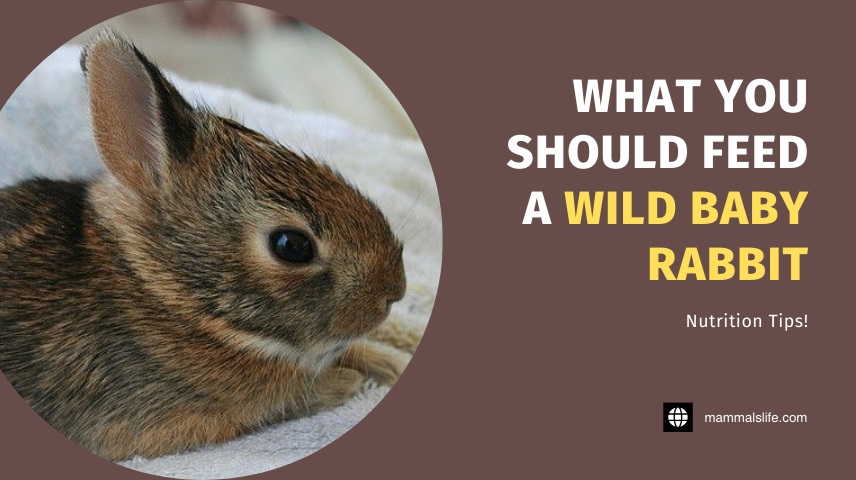Last Updated on February 22, 2025 by Mammals Life
To feed a wild baby rabbit, provide kitten milk replacer and fresh greens. Avoid cow’s milk as it can harm them.
Feeding a wild baby rabbit requires careful attention to its dietary needs. Newborn rabbits need kitten milk replacer, which mimics their mother’s milk. It’s crucial to avoid cow’s milk, as it can cause digestive issues. As the rabbit grows, introduce fresh, pesticide-free greens like dandelion leaves and grass.
Hydration is equally important, so ensure a constant supply of fresh water. Remember, wild rabbits stress easily, so handle them gently and as little as possible. Consulting a wildlife rehabilitator can provide additional guidance and ensure the rabbit’s health and well-being. Proper nutrition and care will increase their chances of survival and eventual release back into the wild.
What You Should Feed A Wild Baby Rabbit?
Wild baby rabbits are delicate creatures that require specific care, especially when it comes to feeding. Knowing what to feed a wild baby rabbit is crucial for its survival and healthy growth. This guide will cover the various stages of a wild rabbit’s development and provide detailed information on their nutritional needs.
Nutritional Needs Of Wild Baby Rabbits
Wild baby rabbits have specific nutritional needs that differ from domestic rabbits. Their diet must be rich in essential nutrients to support their rapid growth. Here are some key components:
- Protein: Essential for muscle and tissue development.
- Fat: Provides energy for growth and activity.
- Fiber: Important for digestive health.
- Calcium and Phosphorus: Needed for bone development.
A balanced diet ensures that wild baby rabbits develop strong muscles, healthy bones, and a robust immune system. In the wild, they get these nutrients from their mother’s milk and, later, from natural vegetation.
Feeding A Newborn Wild Rabbit (0-3 Weeks)
Newborn wild rabbits depend entirely on their mother’s milk. If you find an orphaned rabbit, you will need to provide a suitable milk replacement. Here’s a simple feeding guide:
| Age | Feeding Frequency | Amount per Feeding |
|---|---|---|
| 0-1 week | 2-3 times daily | 2-2.5 ml |
| 1-2 weeks | 2-3 times daily | 5-7 ml |
| 2-3 weeks | 2 times daily | 7-13 ml |
Use a kitten milk replacer or goat milk for feeding. Avoid cow’s milk as it can cause digestive issues. Warm the milk to body temperature before feeding.
Transitioning To Solid Foods (3-6 Weeks)
At around 3 weeks, wild baby rabbits start to nibble on solid foods. It’s essential to introduce solid foods gradually:
- Fresh hay: Timothy hay is a good choice.
- Pellets: Rabbit-specific pellets provide necessary nutrients.
- Fresh greens: Dandelion greens, parsley, and clover are excellent options.
During this transition period, continue to provide milk until they are fully weaned. Monitor their eating habits and ensure they are consuming enough solid food.
Feeding A Growing Wild Rabbit (6+ Weeks)
Once wild rabbits are over 6 weeks old, they are ready for a diet similar to adult rabbits. Here’s what their diet should include:
- Unlimited hay: Timothy hay or meadow hay.
- Fresh vegetables: Kale, romaine lettuce, and carrot tops.
- Limited fruits: Apples, bananas, and berries as treats.
Avoid foods that are toxic to rabbits, such as chocolate, avocado, and iceberg lettuce. Fresh water should always be available.
Hydration And Water Needs
Hydration is crucial for wild baby rabbits. Ensure they have access to clean, fresh water at all times. For newborns, hydration comes from milk. As they grow, water becomes a vital part of their diet.
Use a shallow dish to provide water, making it easy for them to drink. Change the water daily to keep it fresh and free from contaminants.
Special Considerations For Orphaned Wild Rabbits
Orphaned wild rabbits need extra care. Ensure they are kept in a warm, quiet place and handle them as little as possible to reduce stress.
If you are unsure about their care, consult with a wildlife rehabilitator for guidance. They can provide specific instructions and support for raising orphaned rabbits.
Remember, raising wild rabbits is challenging, and their best chance of survival is often with a professional rehabilitator.
Frequently Asked Questions
What Should I Feed A Wild Baby Rabbit?
A wild baby rabbit can be fed a kitten milk replacer.
How Often To Feed A Wild Baby Rabbit?
Feed a wild baby rabbit every 3-4 hours.
Can Wild Baby Rabbits Drink Cow’s Milk?
No, cow’s milk can harm wild baby rabbits.
Is It Safe To Handle Wild Baby Rabbits?
Minimize handling to reduce stress and potential harm.
What If A Wild Baby Rabbit Won’t Eat?
Contact a wildlife rehabilitator for immediate assistance.
Conclusion
Caring for a wild baby rabbit requires patience and the right knowledge. Proper feeding is crucial for their health. Always consult with a wildlife expert if unsure. Your efforts can make a big difference in their survival. Thank you for taking the time to help these delicate creatures.








